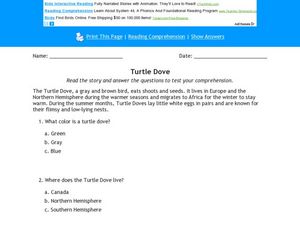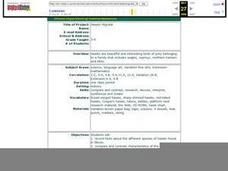Curated OER
Bird Banter
Students listen to examples of common bird songs of birds found in Illinois. As a class, they discover the importance between the differences in songs and calls. They practice making their own bird calls and songs to end the lesson.
Curated OER
Marine & Aquatic Habitats Activities - Estuaries Are for the Birds!
Pupils recognize that birds act as indicators of pollution because of their sensitivity to environmental change, and role play the manner in which marine debris can be hazardous to waterfowl.
Curated OER
Earth's Heavenly Treasures: Hummingbirds
Young ornithologists watch an informative video and use the Internet to gather data about the life, size, habitat, and migration of hummingbirds. The interdisciplinary lesson includes activities that target art, science, math, and...
Chicago Botanic Garden
Unit 3 Pre-Test, Grades 7–9
Earth's systems respond to changes in environments in all types of ways including migration, extinction, adaptation, immigration, and emigration to name a few. Part one in a series of seven is a pre-test consisting of 14 questions. Some...
Curated OER
Migrating Across Borders
Young scholars research and map the migratory patterns of the golden-winged warbler. They develop a strategy to protect this species and, in teams representing different countries, negotiate treaties with each other to protect the bird.
Curated OER
Studying Birds in the Field
This is a well-designed science activity which helps students learn the behavior of different species of birds. Working with partners and in small team, students learn to scientifically observe birds.
Curated OER
Turtle Dove
In this reading comprehension activity, students read a one paragraph text about turtle doves. Students answer one multiple choice question.
Curated OER
Boombox Classroom: Migration of Music
In this music worksheet, students draw quarter notes and half notes. The lesson is dependent on classroom access to a musical lesson from Boombox classroom, found at the Sweet Bird Classics home page.
Curated OER
Get Ready to Hibernate! Migrate! or Get Fat!
Young scholars explore the different ways which animals survive the winter months, and sort animals into correct categories using a Venn diagram.
Curated OER
"For the Birds" [part I]
Young scholars identify birds that appear in Chinese and Japanese art, learning about
their physical characteristics, classifying them according to scientific principles, and exploring their habitats and migration patterns. This is part...
Curated OER
How Does the Rice Farmer Help Birds When They Fly South in the Winter Time?
Students draw a picture of a bird in a rice field. In this social studies lesson, students then fold a piece of paper so that there are 4 spaces. Students then draw one thing in each square that birds get from the rice field.
CK-12 Foundation
Coriolis Effect: Flying... South?
It turns out there's a lot more to heading south for the winter for migratory birds! Study the Coriolis Effect with a fun, hands-on teaching tool. Pupils take to the skies as a small red bird bound for the tropics from his frosty home at...
Curated OER
Week 8 - Sea Life
Using a magnifier, mini marine biologists examine the barbules of a bird feather. They swirl the it into a mixture of oil and water and then re-examine the feather. After the activity, discuss how the oily feathers pose a problem to sea...
Curated OER
Travel Time
Students use a migration map to estimate the distance traveled by a bird while migrating south. After calculating accurate estimates of the distance traveled, students compare the distances traveled with the amount of time elapsed.
Curated OER
Wetland Adaptation
Students participate in a simulation to investigate the impact of the wetland environment on the migration of birds. They discuss the patterns of migration they took and why they avoided certain wetlands.
Curated OER
Hula Hoop Habitats
Students explore migration. In this science activity, students play a game in which they explore bird migration. Students discuss the needs of birds and play a game in which they "migrate" in order to meet their needs.
Curated OER
Verterbrate Classification
Students are introduced to the broad categories of vertebrates including fish, amphibians, reptiles, birds and mammals. They identify the characteristics of each group and then view slideshows and video of example species.
Curated OER
Birds
In this bird worksheet, learners read ten statements about birds and identify them as fact or opinion. Afterward, they complete a word search puzzle and identify 20 words dealing with birds. An answer sheet is provided.
Curated OER
Duck, Duck, GOOSE!
Students examine the migratory cycle of Canada geese, and explore the reasons that some birds have stopped migrating and become residents of an area. They identify the ways which geese are considered pests and explore ways to control...
Curated OER
The Excretory System
In this excretory system worksheet, students read a brief excerpt about water balance and the excretory system. Then they identify what compound birds, insects and reptiles living in dry habitats excrete. Students also describe how...
Curated OER
Hawks Migrate
Students examine the types of hawks found in Illinois and compile a list of them. Using different species of hawks, they compare and contrast their characteristics. They work together to create their own hawk model for the classroom.
Curated OER
Classification of Organisms
For this classification worksheet, students solve 3 classification riddles, complete 6 true and false questions, complete 4 sequences, and solve a riddle about the classification of an animal.
Curated OER
Get Ready, Get Set, Hibernate
Students match each body part or idea from a work bank about methods of animal adaptations for winter survival. They observe as the first one, food is covered with the whole class before completing the rest of the diagram. They discuss...
Curated OER
Animals In Winter
Students read story Animals in Winter, and explore similarities and differences in how humans and other animals prepare for survival in winter. Students create class book that compares and illustrates different ways humans and animals...











!["For the Birds" [part I] Lesson Plan "For the Birds" [part I] Lesson Plan](http://content.lessonplanet.com/resources/thumbnails/122462/large/cgrmlwnvbnzlcnqymdeymtaxny0ynji5lwd4n2h5by5qcgc.jpg?1414222903)













